Few technologies have changed the way we work as much as cloud computing. The idea first appeared in the 1960s, and six decades later it has become a standard part of business and daily life. The medical sector is among the fastest adopters, and today cloud computing in healthcare is changing how providers store, share, and use patient data for better outcomes.
It was only a matter of time before this technology reached hospitals, clinics, and wellness providers. Now, cloud-based healthcare solutions are everywhere in the sector, powering everything from telemedicine platforms to advanced analytics. Let’s take a closer look at how the industry is putting them to use.
Article Highlights:
- Cloud computing, along with artificial intelligence, is a prominent technology transforming modern healthcare, according to research by CHI Software.
- 40% of respondents in our survey believe that implementing innovations is important for healthcare companies – medical cloud computing gives you that strategic edge.
- Not only can Bayer and Pfizer implement cloud computing in their practices, but the technology is available for smaller businesses, too.
- Considering scalability, applying user-based access control, and preparing for outages beforehand are the foundations of successful cloud adoption in healthcare.
What Is Cloud Computing in Healthcare?
Cloud computing means providing users with computing services over the Internet with pay-as-you-go pricing. Such services can vary depending on the user’s needs, from storing information to providing access to software.
When the pandemic pushed everyone back into their homes, cloud computing started to gain more popularity in the healthcare sector. In 2021, the global healthcare cloud computing market was worth 39.1 billion USD. This number is estimated to grow to 102.3 billion USD by 2028.
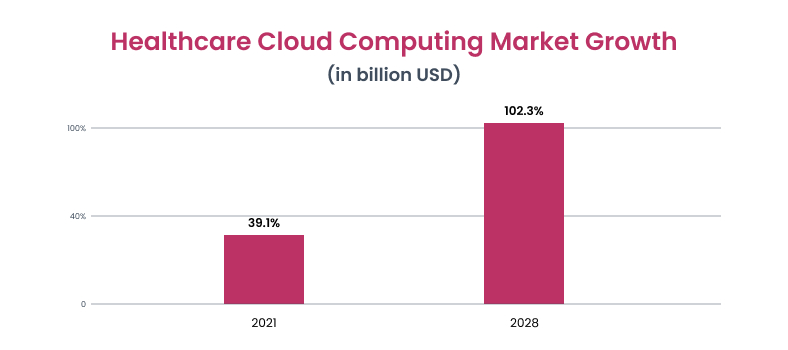
The healthcare cloud computing market shows steady growth and is projected to reach 102 billion USD by 2028.
This market growth is due to advancements in cloud security and AI integration, which have led more healthcare and wellness businesses to consider adopting innovations.
The market data correlates with the healthcare analytics data we at CHI Software collected ourselves. Not so long ago, we conducted a survey of healthcare organizations and wellness businesses. One of the questions we asked was: which technology trend is transforming your business?
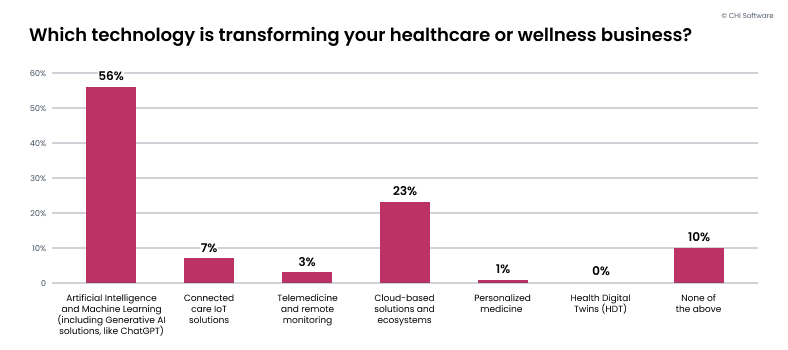
According to CHI Software’s survey, cloud-based healthcare solutions are one of the key drivers of the industry’s transformations.
As you can see, 23% of respondents answered that cloud-based solutions and ecosystems are transforming their businesses. These stats lead us to the conclusion that we experience a steady growth in the adoption of healthcare cloud computing. But is it as good as people say?
Types of Cloud Computing in Healthcare
Healthcare organizations have several approaches to clinical cloud computing, and the choice often depends on data sensitivity and the level of control required.

There are four forms of clinical cloud computing, and many providers lean toward hybrid cloud as the most practical option.
Public Cloud
Public cloud is the model most people are familiar with – Amazon Web Services, Microsoft Azure, or Google Cloud. These platforms allow organizations to store and run applications on shared infrastructure.
The cost is lower, and scaling is simple, which makes public cloud a solid choice for patient engagement apps, training platforms, or research tools. At the same time, it’s usually not the right place for highly sensitive patient records.
Private Cloud
In this case, the entire infrastructure of healthcare cloud technology is dedicated to one organization. Hospitals and insurers often rely on private clouds because they give them full control over security and compliance. It’s the environment where you can safely store electronic health records, diagnostic images, and insurance claims.
Hybrid Cloud
In practice, many providers choose a mix – hybrid cloud is one of the most practical approaches to cloud computing in the healthcare industry today.
Critical patient data stays in the private cloud, while services that benefit from speed and flexibility, like analytics dashboards or appointment scheduling, run in the public cloud. This way, you can get both security and agility.
Multi-Cloud
Some healthcare organizations go further and use several providers at once. One might be responsible for data storage, another for AI diagnostics, and a third for telemedicine platforms. This strategy spreads risk, prevents overreliance on one vendor, and allows each provider to be utilized for what it does best. Multi-cloud strategies are becoming more common as leaders think about the future of cloud computing in healthcare.
Choosing the right model is only the first step. Once the foundation is in place, hospitals begin to see the real impact of cloud computing on healthcare, from lower costs to faster patient care. Let’s look at the benefits.
Key Benefits of Cloud Computing in Healthcare
There are four key advantages of cloud computing in healthcare:
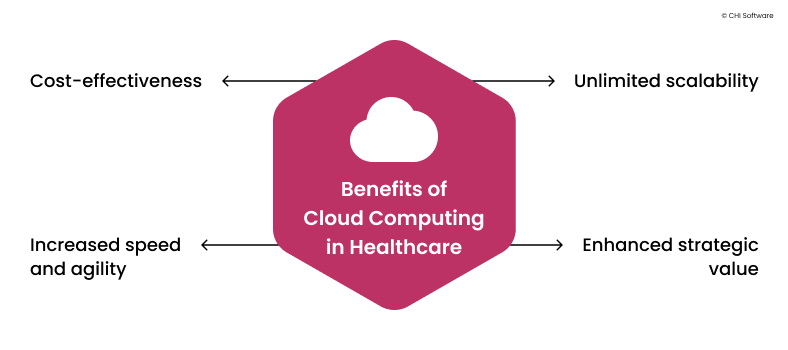
The impact of cloud computing on healthcare is clear, bringing both cost savings and greater efficiency.
Cost-Effectiveness
Before the wide adoption of cloud technology in healthcare, businesses had to have on-premise data centers. These data centers require constant maintenance to provide computing power, storage, and other resources. Needless to say, it wasn’t the cheapest solution, but since there were no alternatives, it was the only choice businesses had.
Contrary to on-site servers, healthcare in the cloud enables businesses to enjoy all the power of data centers without the cost of maintaining them. Businesses only pay for the cloud-based infrastructure and computing resources they use, which makes medical cloud computing one of the most efficient investments for hospitals and clinics.
Increased Speed and Agility
Picture this: your healthcare business wants to adopt new software. To do that, you need to send a request to the IT department, configure hardware to support new software, purchase said software, and then install it. The whole process can take months!
With cloud computing in medicine, healthcare IT efficiency can reach a whole other level. You don’t need to worry about tweaking hardware to support new software. All you need to do is purchase and install the software on your cloud, and that’s it – you’re ready to go without waiting. This agility is one of the clearest examples of how cloud computing and medicine work hand in hand to modernize healthcare delivery.
Predictive Analytics in Healthcare: Improving the Future with AI
Read more
Unlimited Scalability
With physical servers, scalability is the question of how much hardware your business can afford to buy. If you want your business to scale up operations, you must provide enough hardware to match the desired scale.
This approach often comes with additional software expenses and higher maintenance costs, making software product modernization slow, rigid, and expensive, especially in healthcare IT environments.
With cloud computing in the medical field, however, it’s only a matter of purchasing additional computing power. On top of that, as soon as you don’t need it, you don’t need to be stuck with a bunch of useless hardware – you can simply reduce your cloud services needs and save money. This elasticity makes cloud computing in the healthcare industry a more sustainable and cost-effective path forward.
Check out this case: we modernized our client’s legacy oncology software, and the migration to cloud and microservices increased scalability by 25%.
Enhanced Strategic Value
The healthcare industry is often a pioneer in adopting new technologies. In our survey, almost 40% of respondents answered that implementing complex technological solutions is important for their businesses.
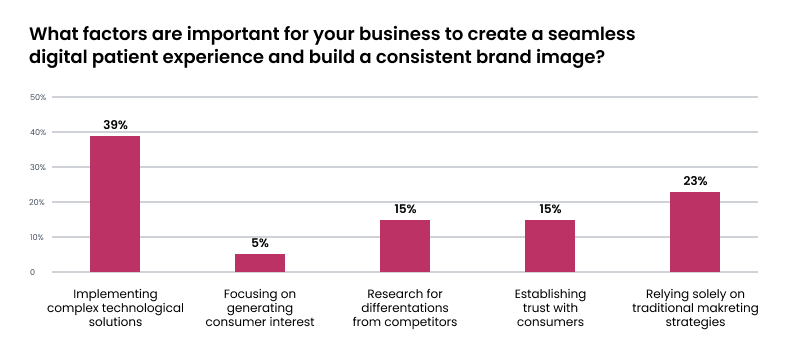
Cloud computing systems and applications in healthcare have the potential to reshape everyday medical practice.
While innovation is always a good thing, your business might struggle to adapt to changes. Thankfully, cloud computing is here to help.
With cloud-based healthcare solutions, you can try out innovations without changing your existing working environment. One of the examples of such technologies is AI.
While AI promises to benefit healthcare immensely, it might be hard to train and store AI models on your business’ local servers. This problem is easily mitigated by medical cloud computing – since you can train and store AI in the cloud.
With proven AI expertise, CHI Software maximizes the benefits of cloud technology in healthcare, creating more reliable solutions. Contact our experts if healthcare AI consulting is something your business is looking for.
To summarize, cloud infrastructure for healthcare brings a lot of value to offer. We know it first-hand – many of our projects used cloud technologies. Let’s open our portfolio and check them out.
Use Cases of Cloud Computing in Healthcare
The healthcare industry can utilize cloud computing in a variety of ways. We have compiled examples of cloud computing in healthcare from all over the world to showcase how they work in the real-world environment.
Fitness App Powered by Cloud Computing
During the COVID pandemic, there was a problem with social interaction between people, and our client aimed to solve this issue. As a leading US healthcare startup, they saw a need for people to have space to socialize while exercising.
They turned an idea into an app. However, they had trouble with creating one of the important features, so they contacted us to do it. This is the story of how the leaderboard by location was born.
Instead of just listing every app user, the leaderboard changes based on the location and additional settings. For example, the user can adjust the leaderboard to show only people from their neighborhood, work, city, or whole state.
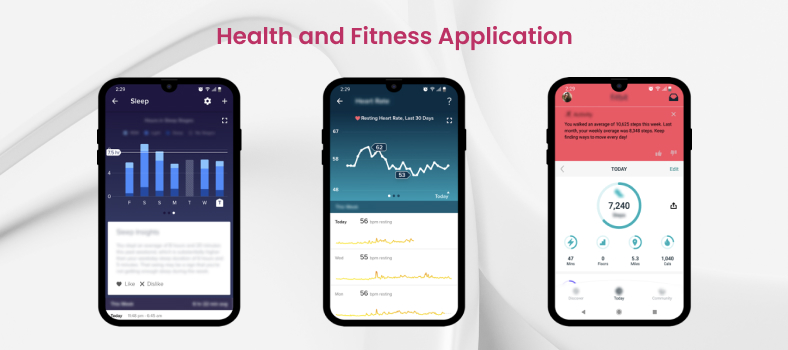
Fitness apps show how cloud computing and medicine can perfectly complement each other.
To implement this feature, we decided to leverage our knowledge of cloud computing in the healthcare market and our AWS partnership to create a serverless system that can be adjusted in seconds.
Applications of cloud computing in healthcare are always a treat for us to work on. We had our shining moment to showcase our cloud computing skills, and users got a quality feature that helped them stay connected even in daring times.
To learn more about this project, you can read our extensive fitness app case study. In the meantime, let’s move on to the next solution.
Remote Patient Monitoring with Cloud Technology
Every parent in the world is concerned about their child’s safety. One of our clients, a US-based startup producing IoT solutions for childcare, decided to provide parents with much-needed ease in mind. They contacted us with an idea to develop a remote nursery monitoring app.
In their vision, the solution would act as a control hub, allowing parents to manage and monitor their baby’s nursery. We decided to expand on it by integrating with various smart home devices, smartphones, laptops, wearable tech, etc. This integration is seamless, meaning parents can always stay connected from any location.
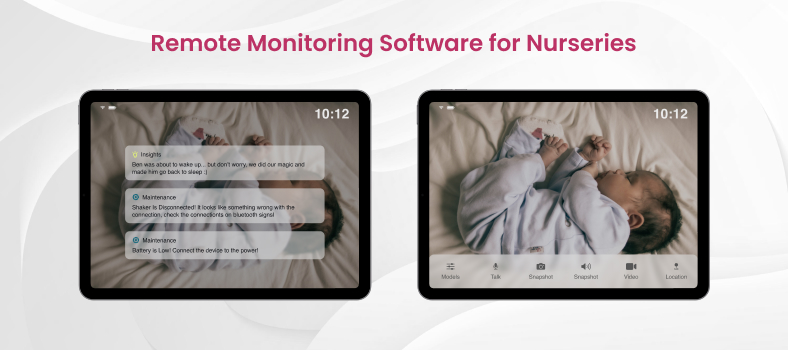
When it comes to IoT-based remote monitoring, clinical cloud computing has become indispensable.
As you can probably guess by now, this solution heavily relies on healthcare data in the cloud. We used various AWS services to ensure seamless connection and smart house integration support. The result is an innovative all-in-one app filled to the brim with features:
- Remote monitoring of the child’s activities via video cameras;
- Notifications about the child’s current state;
- Reports on the child’s activities and overall health state;
- Stats and graphs for better statistics understanding;
- Timer to schedule activation of various smart house appliances;
- Settings to adjust the app for a comfortable user experience.
The project is still ongoing but has already shown promising results. Our client reports a 15% in user engagement and a 10% increase in parent satisfaction. Projects like this one show how cloud computing systems and applications in healthcare can transform everyday routines while giving families peace of mind.
Be sure to read more about this connected nursery software. Meanwhile, let’s cover some more use cases of cloud computing in healthcare.
Pfizer’s Trial Testing and Cloud Computing
Not so long ago, pharmaceutical giant Pfizer collaborated with Amazon to create cloud-based solutions for accelerating clinical trial testing.
Pfizer utilized Amazon’s SageMaker, which can build, train, and deploy machine learning (ML) models that process equipment data to detect anomalies, predict maintenance needs, and reduce equipment downtime.
In addition, Pfizer collaborates with Amazon’s AWS to extract information from a vast dataset of legacy documents containing insights about drug development and analytical tests.
Microsoft Introduces Mercy to Cloud Computing
Mercy Hospital network is among the top 20 largest US health systems. In 2023, they announced a partnership with Microsoft to create a platform that would improve patient care and experiences.
Mercy plans to use Microsoft’s cloud services with Azure OpenAI to improve care in two key ways:
- Providing patients with helpful information so that they can better understand their lab results and participate in informed discussions with doctors;
- Using generative AI to answer patient’s calls and create personalized recommendations.
The tools Microsoft provides to Mercy allow them to experiment with AI and create a cloud-based solution that will help patients and doctors alike. This tool is one of the most promising cloud computing applications in healthcare, showing how leading providers adopt AI-driven tools to support both staff and patients.
Big Data, Big Impact: How Analytics Are Transforming Healthcare
Read more
Bayer’s Radiology Practices and Cloud Computing
Bayer, based in Germany, is one of the largest pharmaceutical companies in the world. Recently, they announced a collaboration with Google Cloud to create AI solutions that aim to help radiologists in their work.
Bayer was already developing a platform for further development of AI-powered solutions, but they quickly hit the wall. This is because, to develop such a big platform, they needed to scale their operations. Luckily, Google Cloud decided to help out. They provided access to their generative AI tools, as well as cloud services.
The platform’s ultimate goal is to provide radiologists with supportive tools for analyzing large amounts of medical data.
Best Practices in Cloud Computing for the Healthcare Industry
Adopting cloud computing in hospitals works best when providers combine strong technology choices with practical day-to-day management. These practices help organizations stay efficient and prepared for future challenges:
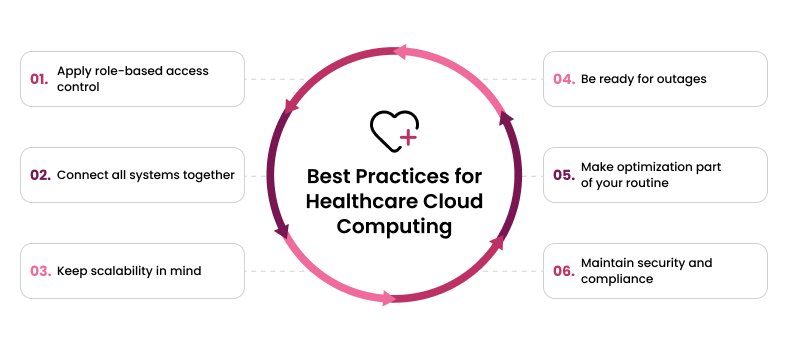
These simple yet effective techniques make clinical cloud computing both practical and easy to adopt.
Use Role-Based Access Control (RBAC)
You should grant access to sensitive records only to those who need it. Clear roles keep staff focused on their own responsibilities and lower the chance of data misuse. RBAC is one of the simplest safeguards in cloud computing for medical offices.
Prioritize Interoperability
Healthcare depends on systems talking to each other: electronic health records, lab databases, telemedicine apps, and wearable devices. Choosing platforms that follow open standards and API-first principles makes this exchange smooth.
Always Keep Scalability in Mind
Demand in healthcare never stays the same. Flu seasons, telehealth spikes, or service expansion can put pressure on IT systems overnight. Cloud architectures designed for growth can take on these peaks without compromising performance.
Prepare for Recovery
Downtime in healthcare can disrupt critical services. A strong recovery plan includes automatic backups and multi-region deployment so services remain available even in emergencies.
Make Optimization Part of Your Routine
Cloud environments need ongoing care. Regular monitoring shows where resources are wasted, where the system slows down, and what your team needs to plan for tomorrow.
Maintain Security and Compliance
Any applications of cloud computing in healthcare must incorporate strict encryption, audit procedures, and alignment with HIPAA, GDPR, or local regulations. Strong compliance practices protect both patient trust and long-term business resilience.
While these practices shape how cloud adoption delivers value day-to-day, security and compliance deserve a closer look. In the next section, we’ll examine how providers strengthen cloud security and meet regulatory standards.
Cloud Security and Compliance in Healthcare
In our recent survey, we asked representatives of healthcare and wellness businesses a question: what is the biggest challenge that currently hinders the growth of the telehealth tech and wellness industries?
Almost 45% of respondents are concerned about data privacy and security. And it’s no wonder – the importance of data security in healthcare cannot be overstated. Patient data must be constantly protected to prevent malicious attacks.
Some businesses might think that having on-premise servers is more secure than utilizing cloud computing, but in reality, it’s not that simple. Contrary to popular belief, the closer the data is to the victim, the easier it is for the hacker to steal it.
Here, we gathered a few of our insights that will help your business enhance security while using clinical cloud computing.
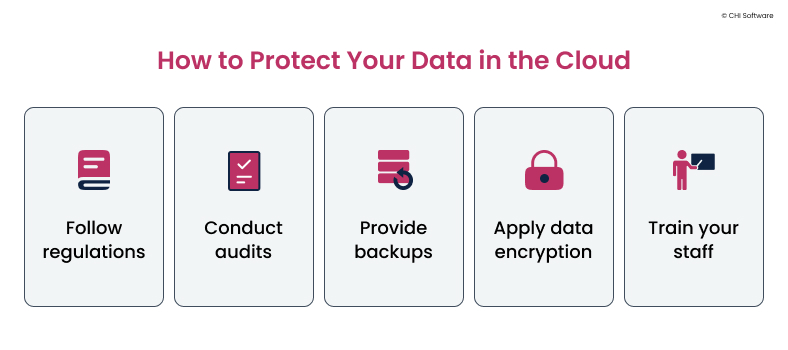
The future of cloud computing in healthcare depends on one thing above all: effective security measures.
1. Understand Existing Regulations
Healthcare businesses must comply with the laws and regulations of the country they operate in. For example, American businesses must comply with HIPAA regulations, while European healthcare businesses must comply with GDPR.
When adopting cloud computing, you need to confirm that the cloud provider complies with regulations as well.
2. Encrypt Your Data and Monitor It
Data encryption is one of the ways to protect sensitive data both in transit and storage, which is especially important when working with cloud computing in hospitals.
Encryption serves as a foundation for another security measure – access control. It allows businesses to determine which information will be accessible to individual users. These basic principles of healthcare data management in the cloud ensure the necessary data safety.
3. Provide Backups
No matter how good your security is, you will always need a backup that continuously copies existing files in case of data loss. Furthermore, you need to have a recovery plan to make use of this backup in the event of a data disaster.
Thanks to cloud computing in the healthcare industry, creating and storing backups has become much easier. It also assures that you can access the data even after natural disasters and loss of physical hardware.
4. Conduct Audits
Auditing has always been important in the healthcare industry, and with the addition of cloud computing for medical offices, you need to adapt the way you conduct it.
A good call would be to monitor data too. This will help you evaluate your business’ compliance with regulations and make your internal controls more effective.
Based on our expertise, we believe that dedicated auditing frameworks are superior to plain logging. These frameworks will provide comprehensive data monitoring, even if your business uses multiple cloud-based services.
5. Train Your Staff
When it comes to security, the most vulnerable part of the system is always the human. This is why you need to train your staff constantly. Training ensures that the weakest link in the chain is familiar with the importance of security, and how to deal with threats.
Major cloud providers usually offer extensive documentation and learning resources to make this process easier.
Healthcare cloud service providers often supply businesses with seminars on cybersecurity, promoting knowledge sharing and ensuring everyone understands cybersecurity’s importance.
Conclusion
Cloud computing is already everywhere. It’s a powerful technology that shines bright in the healthcare industry. Cloud computing has opened up a lot of potential for creative solutions that can help people in new ways.
If you are interested in the benefits of cloud computing in healthcare, you need a team of developers. But not just any team – a team of experts!
We at CHI Software have over ten years of experience in cloud development services, backed by ISO-certified practices. And if it wasn’t enough – we’re also partners of AWS and Microsoft. So, there’s no reason to wait further – contact us today!
FAQs
-
How can cloud computing in medicine help reduce operational costs without compromising care quality?

The savings typically come from more efficient resource use rather than cutting corners. For example:
- Lower infrastructure expenses: No need to maintain bulky local servers.
- Pay-as-you-go pricing: You only pay for the capacity you actually use.
- Reduced IT overhead: Cloud providers are responsible for updates and maintenance.
- More efficient workflows: Faster access to data means less time wasted by staff.
-
What does a typical migration from on-premise systems to medical cloud computing look like?

A well-planned migration usually follows five steps:
1. Assessment: Reviewing current infrastructure, compliance requirements, and workloads.
2. Planning: Deciding which systems move first (often non-critical apps to reduce risk).
3. Pilot migration: Moving a small portion of data to test stability and compliance.
4. Full migration: Shifting the remaining workloads, with minimal downtime.
5. Optimization: Fine-tuning performance, security, and cost-efficiency after the move.
-
How quickly can a healthcare provider move to the cloud?

Timelines vary, but smaller projects, such as a patient engagement portal or analytics dashboard, can be deployed in several weeks. Full-scale migrations, including EHRs and legacy systems, often take several months. The key is phased rollout: start small, gain confidence, then expand.
-
Which healthcare services benefit most from cloud adoption, and where should we start?

Not every service needs to move at once. Providers often see the strongest results in the following areas:
- Telemedicine: Scalable platforms for video consultations.
- Data analytics: Cloud-based tools to spot trends in patient populations.
- Remote patient monitoring: Wearables and IoMT devices that generate continuous data streams.
- Collaboration tools: Secure portals for sharing medical images and test results.
-
What challenges or concerns are associated with implementing cloud computing in the medical field?

The main concerns we hear from providers usually fall into five areas:
- Data security: Patient records are highly sensitive, so encryption and regular audits are a must.
- Regulatory compliance: Cloud setups must meet standards like HIPAA or GDPR.
- System integration: Legacy EHRs and lab systems often need extra work to connect smoothly.
- Reliability: Even short outages disrupt care, which makes redundancy and recovery planning crucial.
- Cost control: The cloud is cost-efficient in the long term, but only if you monitor and manage it effectively.
About the author
Sirojiddin is a seasoned Data Engineer and Cloud Specialist who’s worked across different industries and all major cloud platforms. Always keeping up with the latest IT trends, he’s passionate about building efficient and scalable data solutions. With a solid background in pre-sales and project leadership, he knows how to make data work for business.
Ivan keeps a close eye on all engineering projects at CHI Software, making sure everything runs smoothly. The team performs at their best and always meets their deadlines under his watchful leadership. He creates a workplace where excellence and innovation thrive.
Rate this article
115 ratings, average: 4.87 out of 5

















I recommend testing interoperability early in the project by simulating data flow between at least two different healthcare systems. This technique helps us avoid risks of cloud computing in healthcare, such as costly fixes when expanding cloud solutions in the future.